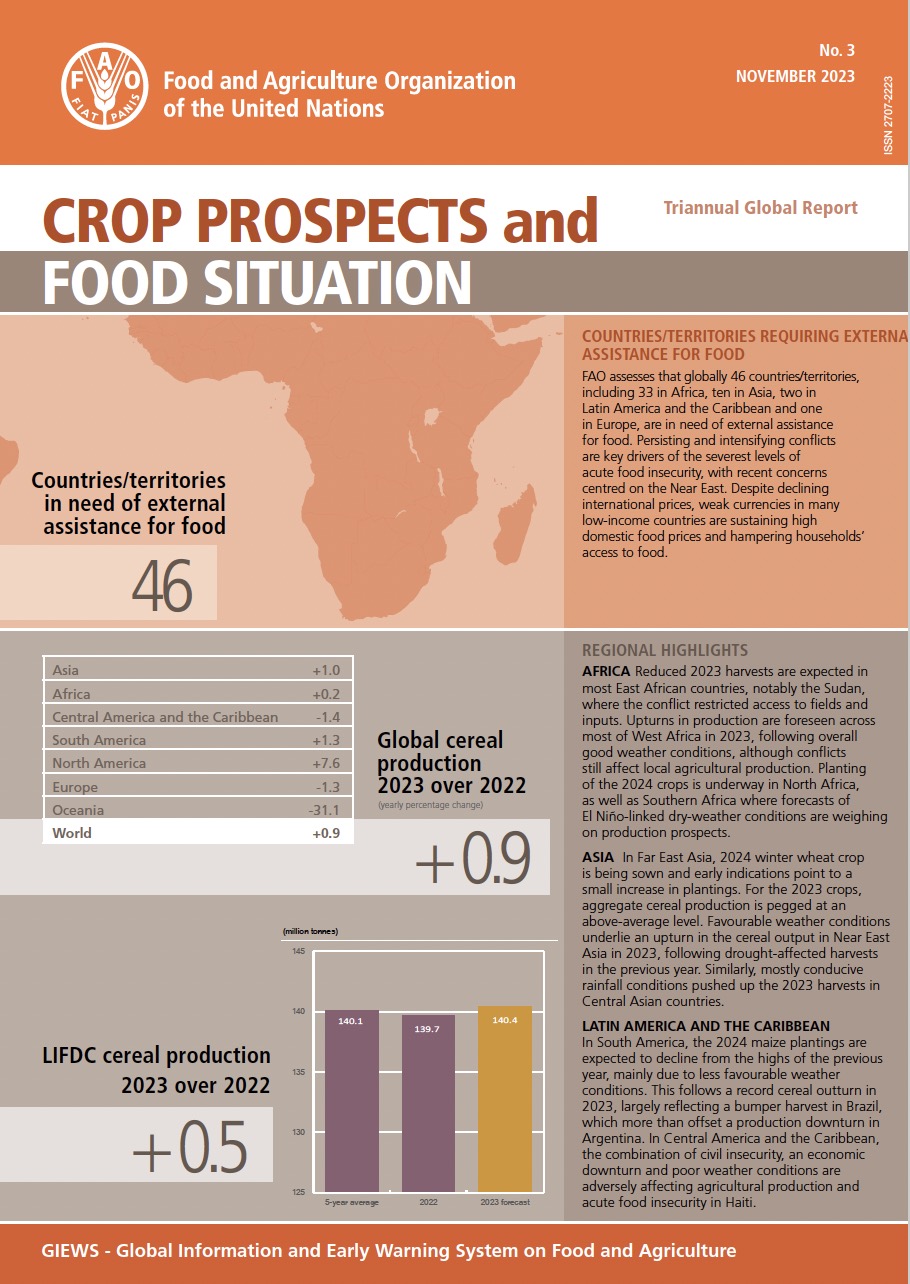FAO's Markets and Trade Division (EST), with its expertise on world agricultural trade, provides analytical and policy information to the United Nations (UN) community, global stakeholders, and beyond. EST keeps a comprehensive market intelligence service of the main agricultural commodities, and houses the Secretariats of the Committee on Commodity Problems (CCP), the Intergovernmental Commodity Groups (IGGs), and the Agricultural Market Information System (AMIS). EST also manages early warnings of food shortfalls.

Global commodity markets
monitors major agricultural commodities, including basic foodstuffs, tropical products and raw materials.

Global Information and Early Warning System (GIEWS)
is the leading source of information on world food production and food security, and it monitors world supply of and demand for basic food.

Trade policy & partnerships
promotes transparent, efficient agricultural commodity markets and trade by supporting its members, including facilitating multistakeholder partnerships.

Emerging trends, challenges and opportunities
produces multidisciplinary analyses related to agricultural trade and markets, and guidance for responsible value chains.
Featured publications
 | The State of Agricultural Commodity MarketsThe State of Agricultural Commodity Markets presents commodity market issues in an objective and accessible way to policy-makers, commodity market observers and stakeholders interested in agricultural commodity market developments and their impacts on countries at different levels of economic development. |
 |
Food Outlook - Biannual Report on Global Food MarketsThe Food Outlook is a biannual publication, focusing on developments affecting global food and feed markets. It provides comprehensive assessments and short-term forecasts for production, utilization, trade, stocks and prices on a commodity-by-commodity basis, along with feature articles on topical issues. |
 |
OECD-FAO Agricultural Outlook
The Agricultural Outlook 2024-2033 is a collaborative effort of the Organisation for Economic Co-operation and Development (OECD) and the Food and Agriculture Organization of the United Nations (FAO). It brings together the commodity,
policy and country expertise of both organisations as well as input from collaborating member countries to provide an annual assessment of the prospects for the coming decade of national, regional and global agricultural commodity
markets.
|
 | Crop Prospects and Food Situation FAO assesses that globally 45 countries, including 33 in Africa, nine in Asia, two in Latin America and the Caribbean and one in Europe, are in need of external assistance for food. Although drought conditions eased in East Africa, production prospects remain unfavourable in 2023, while conflicts in several parts of the African continent are aggravating food security concerns. |
Latest publications
Special committees
Podcasts
SOFI 2024 - Maximo Torero on the latest hunger data
14/10/2024
Around 733 million people faced hunger in 2023, equivalent to one in eleven people globally and one in five in Africa, according to the latest State of Food Security and Nutrition in the World (SOFI) report. Tune in to the FAO Talks podcast with FAO’s Chief Economist Máximo Torero to explore the causes of global hunger.
FAO Brief - 14 October 2024
14/10/2024
In this episode, FAO hosts the fourth edition of the World Food Forum, the largest annual gathering of agrifood systems stakeholders globally in Rome, Italy from 14 to 18 October ; rises in September with quotations up for all covered commodity groups, led by sugar.
Videos
FAO's The State of Agricultural Commodity Markets – Chefs C. Bowerman, V. Gouloubi, and X. Liu
06/12/2024
FAO's The State of Agricultural Commodity Markets 2024 explored the theme, "Trade and nutrition: Policy coherence for healthy diets." The 2024 edition discussed the complex linkages between food trade and nutrition and generates evidence to show how trade can affect dietary patterns and nutritional outcomes.
Honouring women around the world, from crop to cup
23/05/2024
Tea is more than a commodity, it’s a culture, a way of life. A universal symbol of comfort and good health. Much more than a beverage, tea generates employment and income worldwide, enriching the livelihoods of millions of people, empowering whole communities to thrive over generations, and providing stability in an ever-changing world.
Online database applications

Commodity policy development tool
Commodity markets

FPMA
Food Price Monitoring and Analysis

AMIS
Agricultural Market Information System
Global coffee market and
recent price developments
Coffee is one of the most widely consumed beverages worldwide and ranks among the most traded commodities globally. It sustains the livelihoods of some 25 million farmers and creates additional employment throughout the coffee value chain. Read more.


Events
Hybrid Event, Roma (Italy)
Launch of The State of Agricultural Commodity Markets 2024 - Hybrid Event, Friday, 29 November 2024 from 12:00-13:20 hours (CET)
29/11/2024
Trade is an integral part of our agrifood systems. It fulfils the fundamental role of moving food from surplus to deficit regions, thus contributing...
Latest news

FAO Food Price Index remains stable in March
04/04/2025
Related websites
- World Food Situation
- FAO Food Price Index
- FAO Price Data and Analysis
- FAO Responsible Business Conduct (RBC) in Agriculture
- FAO Trade
- FAO Policy Portal
Related links
Contact:















